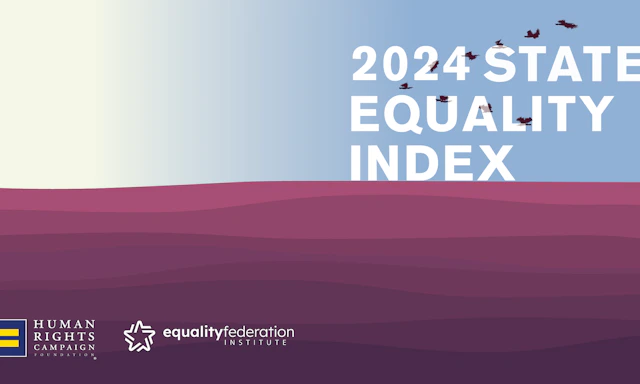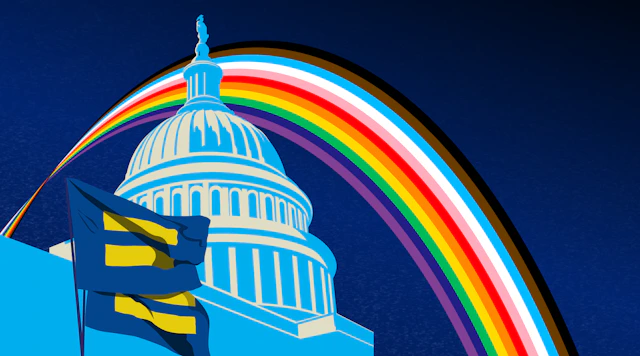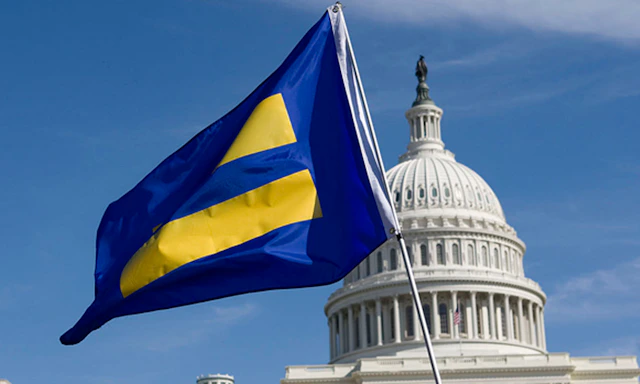
Cookies in use
The Equality Act

The Equality Act would provide consistent and explicit anti-discrimination protections for LGBTQ+ people across key areas of life, including employment, housing, credit, education, public spaces and services, federally funded programs, and jury service.
119th Congress: H.R. 15; S. 1503
The Equality Act was reintroduced in the 119th Congress on April 29, 2025, in the House of Representatives by Rep. Mark Takano (D-CA) and in the Senate by Sens. Jeff Merkley (D-OR), Tammy Baldwin (D-WI), and Cory Booker (D-NJ).
The Problem
Despite significant steps forward, lesbian, gay, bisexual, transgender, and queer (LGBTQ+) Americans continue to experience discrimination across the country. The patchwork nature of state non-discrimination laws and the lack of permanent, comprehensive federal nondiscrimination laws leave millions of people subject to uncertainty and potential discrimination that impacts their safety, their families, and their day-to-day lives.
Our nation’s civil rights laws protect people on the basis of race, color, national origin, and in most cases, sex, disability, and religion. But federal law does not explicitly provide non-discrimination protections based on sexual orientation or gender identity. The need for these protections is clear—nearly two-thirds of LGBTQ+ Americans report having experienced discrimination in their personal lives.
Everyone should have a fair chance to provide a home for their families and access essential services without fear of harassment or discrimination.
What is the Equality Act?
The Equality Act would provide consistent and explicit non-discrimination protections for LGBTQ+ people across key areas of life, including employment, housing, credit, education, public spaces and services, federally funded programs, and jury service.
The Equality Act would amend existing civil rights law—including the Civil Rights Act of 1964, the Fair Housing Act, the Equal Credit Opportunity Act, the Jury Selection and Services Act, and several laws regarding employment with the federal government—to explicitly include sexual orientation and gender identity as protected characteristics. The legislation also amends the Civil Rights Act of 1964 to prohibit discrimination in public spaces and services and federally funded programs on the basis of sex.
Additionally, the Equality Act would update the public spaces and services covered in current law to include retail stores, services such as banks and legal services, and transportation services. These important updates would strengthen existing protections for everyone.
Decades of civil rights history show that civil rights laws are effective in decreasing discrimination because they provide strong federal remedies targeted to specific vulnerable groups. By explicitly including sexual orientation and gender identity in these fundamental laws, LGBTQ+ people will finally be afforded the exact same protections as other covered characteristics under federal law.
We Still Need the Equality Act
In June 2020, the Supreme Court ruled in Bostock v. Clayton County that Title VII of the Civil Rights Act prohibits employment discrimination on the basis of sexual orientation and gender identity because they are types of sex discrimination. While this landmark ruling is a crucial step forward in addressing discrimination against LGBTQ+ people, the Equality Act is still necessary.
President Biden issued an executive order directing agencies to appropriately interpret the Bostock ruling to apply not just to employment discrimination, but to other areas of law where sex discrimination is prohibited, including education, housing, and health care. However, the Trump administration may refuse to interpret the law this way, leaving these protections vulnerable. Congress must codify the Bostock decision by passing the Equality Act to ensure future administrations fully enforce non-discrimination laws.
Additionally, there are two areas of civil rights law that do not currently prohibit sex discrimination, and therefore are not covered by Bostock--federally funded programs and public spaces and services. The Equality Act adds sex, sexual orientation, and gender identity to these sections of the Civil Rights Act. The law covering public spaces and services is also sorely outdated, and the Equality Act updates that law to strengthen protections for everyone.
Broad Support
The nonpartisan Public Religion Research Institute (PRRI) found that nationally, support for a bill like the Equality Act topped 75 percent, which includes a majority of Democrats, Republicans, and Independents. The bill has been endorsed by more than 600 organizations, including civil rights, education, health care, and faith-based organizations, as well as hundreds of major corporations and business associations.
Last Updated: April 29, 2025
- Topics:
- Laws & Legislation
Related Resources
View AllRelated ResourcesLove conquers hate.


